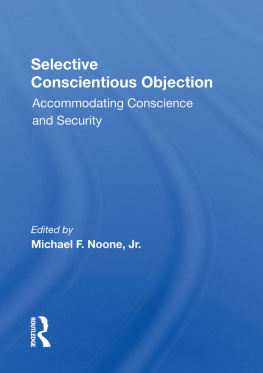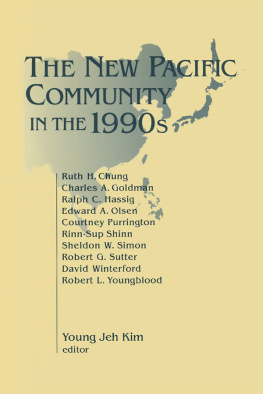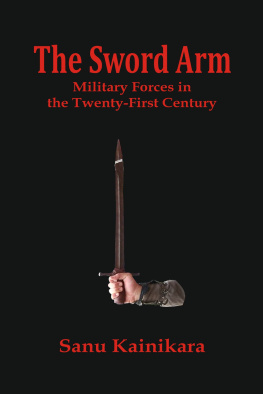Selective Conscientious Objection
Selective Conscientious Objection
Accommodating Conscience and Security
Edited by
Michael F. Noone, Jr.
First published 1989 by Westview Press, Inc.
Published 2019 by Routledge
52 Vanderbilt Avenue, New York, NY 10017
2 Park Square, Milton Park, Abingdon, Oxon OX14 4RN
Routledge is an imprint of the Taylor & Francis Group, an informa business
Copyright 1989 Taylor & Francis
All rights reserved. No part of this book may be reprinted or reproduced or utilised in any form or by any electronic, mechanical, or other means, now known or hereafter invented, including photocopying and recording, or in any information storage or retrieval system, without permission in writing from the publishers.
Notice:
Product or corporate names may be trademarks or registered trademarks, and are used only for identification and explanation without intent to infringe.
Library of Congress Cataloging-in-Publication Data
Selective conscientious objection.
Includes index.
1. Selective conscientious objection. I. Noone, Michael F.
U22.S44 1989 355.2'24 88-201
ISBN 13: 978-0-367-28702-3 (hbk)
Contents
, Michael F. Noone, Jr.
, Kent Greenawalt
, William J. Wagner
, George Q. Flynn
, Gordon C. Zahn
, J. Bryan Hehir
, Walter F. Sullivan
, John P. Langan
, James L. Lacy
, Edward F. Sherman
, Ruth Linn
Guide
The following individuals commented on earlier drafts of this book: Robert Destro, associate professor of law at the Catholic University of America and member of the U.S. Civil Rights Commission; James Finn, editor of Freedom at Issue and of A Conflict of Loyalties: The Case for Selective Conscientious Objection (1968); Robert E. Rodes, Jr., professor of law at Notre Dame Law School, co-editor of The American Journal of Jurisprudence, and author of Law and Liberation (1986); James S. Nanney, historian at the U.S. Army Center of Military History; Thomas Alder, President of the Public Law Education Institute and publisher of The Military Law Reporter and The Selective Service Law Reporter ; Thomas R. Folk, major, U.S. Army (reserve), who, as a judge advocate, represented the United States Army in several cases of conscience; Malham M. Wakin, professor and head of the Department of Philosophy and Fine Arts at the U.S. Air Force Academy and author of War, Morality, and the Military Profession (Westview Press, 2d ed., 1986); Michael Hovey, Executive Director of the Center on Conscience and War; Brian Johnstone, associate professor of theology at the Catholic University of America; L. William Yolton, Executive Director of the National Interreligious Service Board for Conscientious Objectors, and co-author of Ministry to Persons in the Armed Forces (1975); Donald J. Eberly, founder and Executive Director of the National Service Secretariat, and co-editor of National Service: Social, Economic, and Military Impacts (1982); and Tim Murphy, colonel, U.S.M.C. (reserve) and President of the Military Law Institute.
We are also grateful to Wallace Sinaiko of the Inter-University Seminar on Armed Forces and Society, who suggested contributors; Charles Manesca and Catherine Noone Hutchison, who participated in the preparation of this book; and to Patricia Wright, who patiently prepared the manuscript for publication.
Michael F. Noone, Jr.
Michael F. Noone , Jr .
Demographic trends indicate that, if the size of our nation's military forces is to be maintained through the 1990s, a larger proportion of the declining number of eligible young men and women must be recruited and retained. Some experts have suggested that it may be necessary to return to conscription in order to achieve the necessary force levels. However, the pool of young people, on whom the military must rely, have had the unprecedented experience of having been exhorted for most of their lives to conscientiously question the use of armed force. Our political and moral systems are in conflict over their right to refuse military service. Ninety-four percent of Americans believe in God and seventy percent attend a church or synagogue. Their religious leaders insist on the individual's obligation to selectively object to the use of military force and urge that the law be changed to protect selective objectors. At present, the legal system recognizes only the conscientious objection claims of complete pacifists, who need not be religiously motivated. Can the conflicting demands of individual conscience and collective security be reconciled?
The American tradition of military service is as old as the colonies themselves, as is the problem posed by the citizen who refuses on moral grounds to participate in that service. In Pennsylvania and the lower counties along the Delaware River, Quaker scruples against the bearing of arms obliged colonial authorities to find an alternative to militia service. By the middle of the seventeenth century, the existence of a buffer zone between Indian territory and colonial population centers discouraged the use of militia, which were essentially village-centered, and encouraged the use of volunteer expeditionary forces who, by definition, did not object to the use of military force. However, New England and Virginia, where the militia system was strongest, remained wedded to the historical ideal of the citizen-soldier throughout the Revolutionary War and its immediate aftermath.
Washington, Hamilton, and those other nationalists who came to be known as Federalists argued for a centralized military force, and the delegates who gathered in Philadelphia in May 1787 to revise the Articles of Confederation resolved to his efforts failed. Since the Constitution envisaged a small national standing army composed of volunteers, supported by a militia regulated by individual states, which could make whatever provisions for pacifist scruples they saw fit, the right of the Federal government to demand military service from those unwilling to give it remained unresolved.
In 1863, a compulsory draft law was adopted by Congress and implemented without challenge in the Federal courts. Those who rioted in opposition to the draft did so, not because their religious sensibilities were offended, but because they refused to risk their lives for what they saw as an alien cause. Members of "peace churches" were exempt by law, as they were in the Selective Service Act of 1917 which exempted from combat duty:
Those individuals who were found by a local board to be a member of any well-recognized religious sect or organization, organized and existing on May 18, 1917, and whose then existing creed or principles forbid its members to participate in war in any form, and whose religious convictions are against war or participation therein in accordance with the creed or principles of said religious organizations.
Conscientious objection, in order to qualify for legal protection, had thus to be absolute (opposition to war in any form) and religiously motivatedclearly reflecting the same concerns that had motivated the accommodations granted Quakers since colonial days.
The Selective Training and Service Act of 1940 did not require conscientious objectors to be members of a church, but it did require their opposition to war to be based on religious training and belief. to interpret the statute to accommodate their claims. There the matter rests today, shorn of its urgency because the United States no longer depends on the draft to meet its manpower needs.






